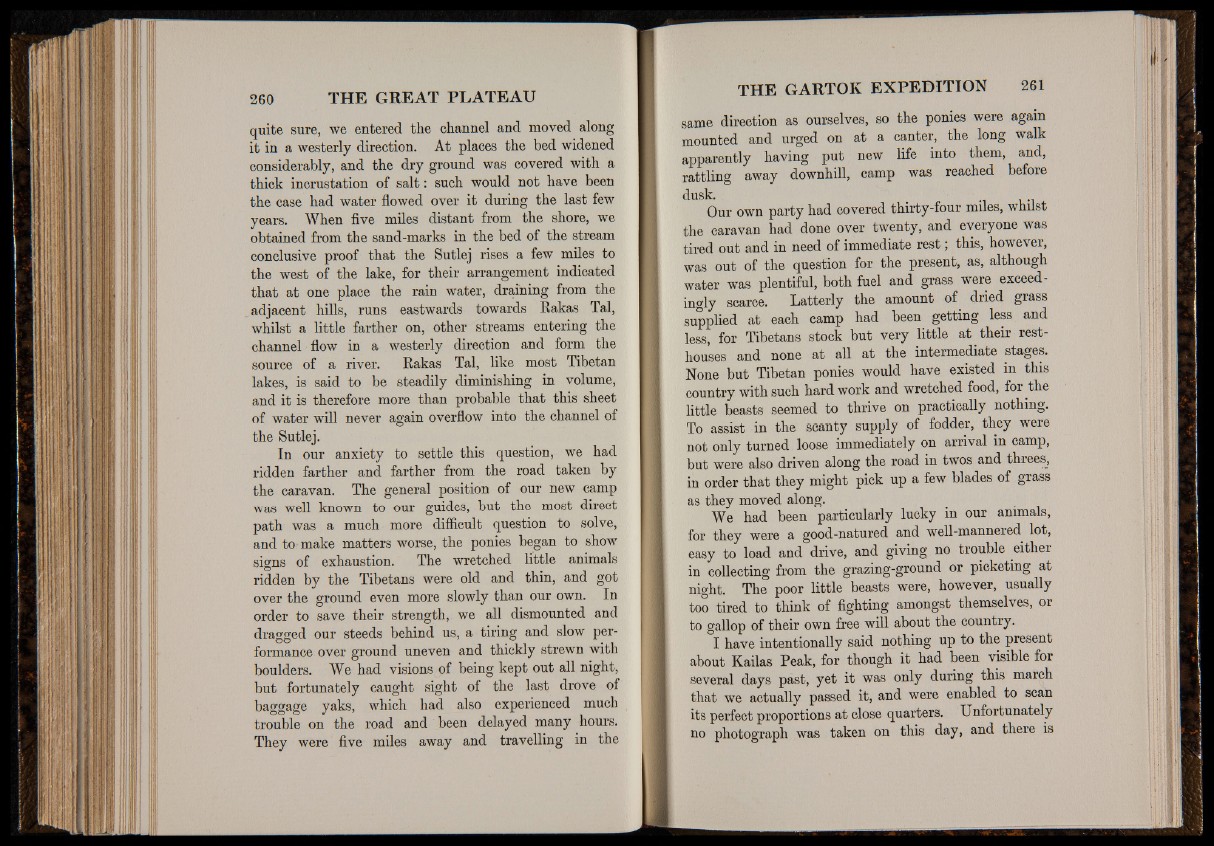
quite sure, we entered the channel and moved along
it in a westerly direction. At places the bed widened
considerably, and the dry ground was covered with a
thick incrustation of s a lt: such would not have been
the case had water flowed over it during the last few
years. When five miles distant from the shore, we
obtained from the sand-marks in the bed of the stream
conclusive proof that the Sutlej rises a few miles to
the west of the lake, for their arrangement indicated
that at one place the rain water, draining from the
adjacent hills, runs eastwards towards Rakas Tal,
whilst a little farther on, other streams entering the
channel flow in a westerly direction and form the
source of a river. Rakas Tal, like most Tibetan
lakes, is said to be steadily diminishing in volume,
and it is therefore more than probable that this sheet
of water will never again overflow into the channel of
the Sutlej.
In our anxiety to settle this question, we had
ridden farther and farther from the road taken by
the caravan. The general position of our new camp
was well known to our guides, but the most direct
path was a much more difficult question to solve,
and to make matters worse, the ponies began to show
signs of exhaustion. The wretched little animals
ridden by the Tibetans were old and thin, and got
over the ground even more slowly than our own. In
order to save their strength, we all dismounted and
dragged our steeds behind us, a tiring and slow performance
over ground uneven and thickly strewn with
boulders. We had visions of being kept out all night,
but fortunately caught sight of the last drove of
baggage yaks, which had also experienced much
trouble on the road and been delayed many hours.
They were five miles away and travelling in the
same direction as ourselves, so the ponies were again
mounted and urged on at a canter, the long walk
apparently having put new life into them, and,
rattling away downhill, camp was reached before
dusk.
Our own party had covered thirty-four miles, whilst
the caravan had done over twenty, and everyone was
tired out and in need of immediate rest; this, however,
was out of the question for the present, as, although
water was plentiful, both fuel and grass were exceedingly
scarce. Latterly the amount of dried grass
supplied at each camp had been getting less and
less, for Tibetans stock but very little at their rest-
houses and none at all at the intermediate stages.
None but Tibetan ponies would have existed in this
country with such hard work and wretched food, foi the
little beasts seemed to thrive on practically nothing.
To assist in the scanty supply of fodder, they were
not only turned loose immediately on arrival in camp,
but were also driven along the road in twos and threes,
in order that they might pick up a few blades of grass
as they moved along.
We had been particularly lucky in our animals,
for they were a good-natured and well-mannered lot,
easy to load and drive, and giving no trouble either
in collecting from the grazing-ground or picketing at
night. The poor little beasts were, however, usually
too tired to think of fighting amongst themselves, or
to gallop of their own free will about the country.
I have intentionally said nothing up to the present
about Kailas Peak, for though it had been visible for
several days past, yet it was only during this march
that we actually passed it, and were enabled to scan
its perfect proportions at close quarters. Unfortunately
no photograph was taken on this day, and there is